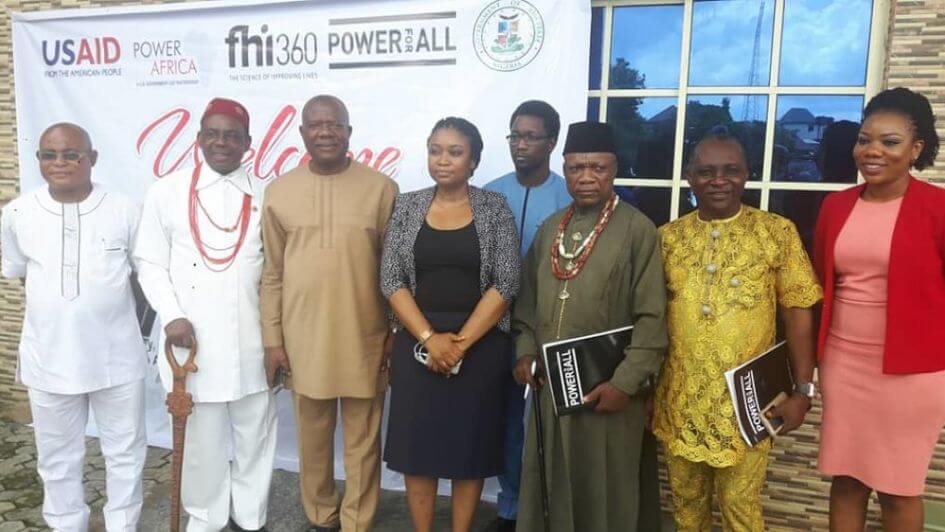Growing Demand by Nigerian States for DRE Training
During two regional DRE 101 workshop in Kogi and Enugu with high-level state and regional policymakers, the Power for All team received a deluge of requests from other states for similar training. Power for All has been conducting the trainings as part of the Scaling Off-Grid Energy (SOGE) project, but was only funded to do a series of six regions.
Then Abia State announced their intention to fund six members of the Power for All team to replicate the DRE 101 for 150 policymakers and bureaucrats in May. The State Governor and Deputy Governor attended, as well as officials from various government ministries, agencies and departments.
“We are completely amazed at their commitment to making this happen,” said Ifeola Malo, Power for All’s Country Director in Nigeria. “Abia State is one of Nigeria’s three largest small-scale manufacturing and trading zones. They see electricity as integral to making the country the number one hub for manufacturing and trading. That’s why this is important to them.”
Around seven of Power for All’s technology and corporate partners came to Abia to partake in this training. The workshop opened potentially new markets for Power for All’s private sector partners as communities, while the government initiated conversations with partners regarding the siting of mini-grids as a way to increase rural electrification in the state.
Allwell Okere, Abia Commissioner for Energy, said: “Abia State is ready to embrace DRE and is looking to work with Power for All to set up a taskforce and build a framework that will drive DRE adoption in the state in order to help it meet its 100% electrification rate target by 2020.”
Meanwhile, the third regional DRE 101 workshop was held in Calabar in the South South region of Nigeria on June 12–13, with a total of 120 attendees comprising policymakers from Cross River, Akwa Ibom and Edo states, and community and civil society organizations. For many of those in attendance, it was their first point of awareness with DRE solutions and the session helped to dispel misconceptions of renewable energy. The workshop also provided an opportunity for the attendees to share ideas on how to increase energy access in their states through government policy, customer and community engagement, and media and advocacy.
Nigeria Country Director on Battery Recycling
Batteries International, a trade publication for the energy storage and battery industry, interviewed Power for All’s Nigeria Country Director, Ifeoma Malo on the growing problem of improper management of used lead-acid battery in the country.
Malo highlighted the fact that only 13% of used lead-acid batteries in Nigeria are properly recycled with only one official lead battery recycling plant. She added that with the Federal Government’s target of 10,000 mini-grids by 2023, it meant there will have to be a framework for disposing of these used batteries as well as more recycling plants.
“There is going to be a huge amount of batteries coming into the country for these mini-grid installations. In seven to 10 years’ time, these will be reaching their end of life and we don’t have systems in place to deal with them,” she said.
“We are working with the government and the ministry of the environment, to create a framework for battery disposal to create some sort of regulatory framework.”
PEAK Data Platform Nears July 2018 Launch Date
Through its campaign, Power for All has found that stakeholders within the sector lack access to relevant information about distributed technologies, policies and markets.
In July, Power for All will officially launch the Platform for Energy Access Knowledge (PEAK), a new interactive knowledge platform designed to curate, organize and synthesize relevant DRE data into digestible, shareable and usable knowledge.
Through a specialized DRE library, data management and storage, data indexing, document annotation and data visualization tools, PEAK will help aggregate and repackage the best information into compelling data-driven knowledge products for individuals, organizations and communities working to make energy accessible to all.
Spotlighting Mini-Grids
While continuing to support the overall DRE sector, Power for All has been working this year to help elevate the role of mini-grids in addressing electricity access, through both communications and advocacy.
Two recent collaborations have resulted in high-profile thought leadership perspectives. Hannah Daly, co-author of the International Energy Agency's (IEA) recent Energy Access Outlook, was published by the World Economic Forum, outlining the potential for mini-grids to connect 450 million people by 2030.
In addition, Power for All worked with the Africa Mini-grid Developers Association and Smart Power India to put forward a global vision for the sector by the private sector, which was published in Project Syndicate, a global platform for leading opinion.
Congrats to all the Ashden Awards winners!
Many partners in the Power for All campaign were finalists in the 2018 Ashden Awards, which celebrate the best in sustainable energy. This year’s winners are pioneering sustainable energy solutions that transform livelihoods across three continents and address climate change from every angle.
The international winners include Angaza, which develops and markets hardware and software that enables clean energy products such as solar lanterns, solar home systems and mobile phone charging points to be remotely controlled—including being switched on and off—so they can be run on a Pay-As-You-Go (PAYG) basis.
Chhattisgarh State Renewable Energy Development Agency (CREDA) has implemented solar PV, inverter and battery storage systems in almost 1,000 health centres of all sizes in Chhattisgarh State, central India. Ecozen Solutions enables farmers in Pune, western India to store produce at the point of harvest giving them greater control over distribution thanks to solar-powered cold rooms.
Lumos Global, the largest provider of off-grid solar systems in Nigeria, provides householders and businesses with a simple, affordable way to pay for solar energy on a subscription basis. Lumos customers sign up for the service at their local MTN mobile phone network stores and pay in small instalments via text message.
